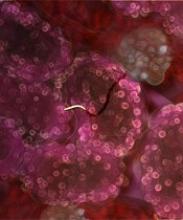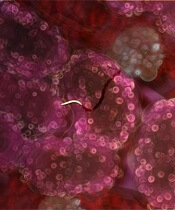User login
Carbohydrates on the surface of malaria parasites play a critical role in the parasites’ ability to infect mosquito and human hosts, according to research published in Nature Communications.
Researchers found that Plasmodium falciparum “tags” its proteins with carbohydrates in order to stabilize and transport them.
And this process is crucial to completing the parasite’s life cycle.
“Malaria parasites have a complex life cycle that involves constant shape-shifting to evade detection and infect humans and, subsequently, mosquitoes,” said study author Justin Boddey, PhD, of The Walter and Eliza Hall Institute of Medical Research in Parkville, Victoria, Australia.
“We found that the parasite’s ability to ‘tag’ key proteins with carbohydrates is important for 2 stages of the malaria life cycle. It is critical for the earliest stages of human infection, when the parasite migrates through the body and invades in the liver, and later, when it is transmitted back to the mosquito from an infected human, enabling the parasite to be spread between people.”
“Interfering with the parasite’s ability to attach these carbohydrates to its proteins hinders liver infection and transmission to the mosquito and weakens the parasite to the point that it cannot survive in the host.”
Dr Boddey and his colleagues said this research suggests steps that may improve the efficacy of the malaria vaccine RTS,S/AS01 (Mosquirix).
“The protein used in the RTS,S vaccine mimics one of the proteins we’ve been studying on the surface of the malaria parasite that is readily recognized by the immune system,” said study author Ethan D. Goddard-Borger, PhD, of The Walter and Eliza Hall Institute of Medical Research.
“It was hoped that the vaccine would generate a good antibody response that protected against the parasite. However, it has, unfortunately, not been as effective at evoking protective immunity as hoped.”
“With this study, we’ve shown that the parasite protein is tagged with carbohydrates, making it slightly different to the vaccine, so the antibodies produced may not be optimal for recognizing target parasites.”
Dr Goddard-Borger said there were many documented cases where attaching carbohydrates to a protein improved its efficacy as a vaccine.
“It may be that a version of RTS,S with added carbohydrates will perform better than the current vaccine,” he said. “Now that we know how important these carbohydrates are to the parasite, we can be confident that the malaria parasite cannot ‘escape’ vaccination pressure by doing away with its carbohydrates.” ![]()
Carbohydrates on the surface of malaria parasites play a critical role in the parasites’ ability to infect mosquito and human hosts, according to research published in Nature Communications.
Researchers found that Plasmodium falciparum “tags” its proteins with carbohydrates in order to stabilize and transport them.
And this process is crucial to completing the parasite’s life cycle.
“Malaria parasites have a complex life cycle that involves constant shape-shifting to evade detection and infect humans and, subsequently, mosquitoes,” said study author Justin Boddey, PhD, of The Walter and Eliza Hall Institute of Medical Research in Parkville, Victoria, Australia.
“We found that the parasite’s ability to ‘tag’ key proteins with carbohydrates is important for 2 stages of the malaria life cycle. It is critical for the earliest stages of human infection, when the parasite migrates through the body and invades in the liver, and later, when it is transmitted back to the mosquito from an infected human, enabling the parasite to be spread between people.”
“Interfering with the parasite’s ability to attach these carbohydrates to its proteins hinders liver infection and transmission to the mosquito and weakens the parasite to the point that it cannot survive in the host.”
Dr Boddey and his colleagues said this research suggests steps that may improve the efficacy of the malaria vaccine RTS,S/AS01 (Mosquirix).
“The protein used in the RTS,S vaccine mimics one of the proteins we’ve been studying on the surface of the malaria parasite that is readily recognized by the immune system,” said study author Ethan D. Goddard-Borger, PhD, of The Walter and Eliza Hall Institute of Medical Research.
“It was hoped that the vaccine would generate a good antibody response that protected against the parasite. However, it has, unfortunately, not been as effective at evoking protective immunity as hoped.”
“With this study, we’ve shown that the parasite protein is tagged with carbohydrates, making it slightly different to the vaccine, so the antibodies produced may not be optimal for recognizing target parasites.”
Dr Goddard-Borger said there were many documented cases where attaching carbohydrates to a protein improved its efficacy as a vaccine.
“It may be that a version of RTS,S with added carbohydrates will perform better than the current vaccine,” he said. “Now that we know how important these carbohydrates are to the parasite, we can be confident that the malaria parasite cannot ‘escape’ vaccination pressure by doing away with its carbohydrates.” ![]()
Carbohydrates on the surface of malaria parasites play a critical role in the parasites’ ability to infect mosquito and human hosts, according to research published in Nature Communications.
Researchers found that Plasmodium falciparum “tags” its proteins with carbohydrates in order to stabilize and transport them.
And this process is crucial to completing the parasite’s life cycle.
“Malaria parasites have a complex life cycle that involves constant shape-shifting to evade detection and infect humans and, subsequently, mosquitoes,” said study author Justin Boddey, PhD, of The Walter and Eliza Hall Institute of Medical Research in Parkville, Victoria, Australia.
“We found that the parasite’s ability to ‘tag’ key proteins with carbohydrates is important for 2 stages of the malaria life cycle. It is critical for the earliest stages of human infection, when the parasite migrates through the body and invades in the liver, and later, when it is transmitted back to the mosquito from an infected human, enabling the parasite to be spread between people.”
“Interfering with the parasite’s ability to attach these carbohydrates to its proteins hinders liver infection and transmission to the mosquito and weakens the parasite to the point that it cannot survive in the host.”
Dr Boddey and his colleagues said this research suggests steps that may improve the efficacy of the malaria vaccine RTS,S/AS01 (Mosquirix).
“The protein used in the RTS,S vaccine mimics one of the proteins we’ve been studying on the surface of the malaria parasite that is readily recognized by the immune system,” said study author Ethan D. Goddard-Borger, PhD, of The Walter and Eliza Hall Institute of Medical Research.
“It was hoped that the vaccine would generate a good antibody response that protected against the parasite. However, it has, unfortunately, not been as effective at evoking protective immunity as hoped.”
“With this study, we’ve shown that the parasite protein is tagged with carbohydrates, making it slightly different to the vaccine, so the antibodies produced may not be optimal for recognizing target parasites.”
Dr Goddard-Borger said there were many documented cases where attaching carbohydrates to a protein improved its efficacy as a vaccine.
“It may be that a version of RTS,S with added carbohydrates will perform better than the current vaccine,” he said. “Now that we know how important these carbohydrates are to the parasite, we can be confident that the malaria parasite cannot ‘escape’ vaccination pressure by doing away with its carbohydrates.” ![]()

